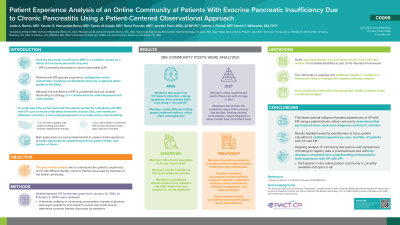Back


Poster Session C - Monday Afternoon
Category: Biliary/Pancreas
C0006 - Patient Experience Analysis of an Online Community of Patients With Exocrine Pancreatic Insufficiency due to Chronic Pancreatitis Using a Patient-Centered Observational Approach
Monday, October 24, 2022
3:00 PM – 5:00 PM ET
Location: Crown Ballroom

Has Audio

Jodie A. Barkin, MD
University of Miami, Miller School of Medicine
Miami, FL
Presenting Author(s)
Jodie A. Barkin, MD1, Yasmin G. Hernandez-Barco, MD2, Samer Al-Kaade, MD3, Rahul Pannala, MD4, Jennifer Pack, MSN5, Valerie J. Powell, MS6, David C. Whitcomb, MD7
1University of Miami, Miller School of Medicine, Miami, FL; 2Massachusetts General Hospital, Boston, MA; 3Mercy Clinic Gastroenterology, St. Louis, MO; 4Mayo Clinic Arizona, Phoenix, AZ; 5Aimmune Therapeutics, a Nestlé Health Science company, Brisbane, CA; 6CorEvitas, LLC, Arlington, VA; 7University of Pittsburgh, UPMC and Ariel Precision Medicine, Pittsburgh, PA
Introduction: Exocrine pancreatic insufficiency (EPI) occurs in patients (pts) with a relative deficit of functional pancreatic enzymes, commonly secondary to chronic pancreatitis (CP). Pts with EPI typically experience maldigestion/malnutrition, negatively affecting quality of life (QoL). A two-pronged approach using a US-based registry for pts with EPI taking pancreatic enzyme replacement therapy and an online pt community with structured/unstructured data collection activities is being implemented to capture data/experiences to better appreciate the pt’s lived experience, pt needs, and burden of illness. The goal of this study was to understand the pt’s experience of CP with EPI and identify common themes discussed by members of the community.
Methods: A thematic analysis approach, utilizing HealthUnlocked CP community posts from 13JAN2022 to 02FEB2022, was used to identify/analyze common themes discussed by members.
Results: In total, 386 community posts were analyzed. Key topics were pain, diagnosis, treatment, and diet. Members frequently discussed CP-related pain impacting QoL. Members reported difficulty finding the source of and adequate treatment options for pain, often leading to prolonged pain. Sharing diagnosis experiences, members often found specialists the most helpful, actively seeking providers working to alleviate symptoms and not dismissive of concerns; some were frustrated with misconceptions from providers. Generally, members tried many treatment options before finding the right combination. Common treatment discussions included opioids, enzyme treatments, alternative medicine, other medications, diabetes management, and dietary changes; some found nontraditional treatments effective. Many members found CP-related pain and symptoms were greatly influenced by diet; changes often caused painful flare-ups. Members described CP symptoms were influenced by low fat diet, limiting alcohol consumption, vegan/vegetarian diets, herbal teas, and bland food.
Discussion: This observational analysis of pt experiences of CP with EPI using a pt-driven online community determined key areas of focus including pain, diagnosis, treatment, and diet. Results highlight areas for practitioners to focus pt education to optimize experiences/care and QoL of pts with CP with EPI. Ongoing analysis of community discussions and comparisons of findings to registry data is practical/novel and will help develop a comprehensive understanding of the pt’s lived experience.
Disclosures:
Jodie A. Barkin, MD1, Yasmin G. Hernandez-Barco, MD2, Samer Al-Kaade, MD3, Rahul Pannala, MD4, Jennifer Pack, MSN5, Valerie J. Powell, MS6, David C. Whitcomb, MD7. C0006 - Patient Experience Analysis of an Online Community of Patients With Exocrine Pancreatic Insufficiency due to Chronic Pancreatitis Using a Patient-Centered Observational Approach, ACG 2022 Annual Scientific Meeting Abstracts. Charlotte, NC: American College of Gastroenterology.
1University of Miami, Miller School of Medicine, Miami, FL; 2Massachusetts General Hospital, Boston, MA; 3Mercy Clinic Gastroenterology, St. Louis, MO; 4Mayo Clinic Arizona, Phoenix, AZ; 5Aimmune Therapeutics, a Nestlé Health Science company, Brisbane, CA; 6CorEvitas, LLC, Arlington, VA; 7University of Pittsburgh, UPMC and Ariel Precision Medicine, Pittsburgh, PA
Introduction: Exocrine pancreatic insufficiency (EPI) occurs in patients (pts) with a relative deficit of functional pancreatic enzymes, commonly secondary to chronic pancreatitis (CP). Pts with EPI typically experience maldigestion/malnutrition, negatively affecting quality of life (QoL). A two-pronged approach using a US-based registry for pts with EPI taking pancreatic enzyme replacement therapy and an online pt community with structured/unstructured data collection activities is being implemented to capture data/experiences to better appreciate the pt’s lived experience, pt needs, and burden of illness. The goal of this study was to understand the pt’s experience of CP with EPI and identify common themes discussed by members of the community.
Methods: A thematic analysis approach, utilizing HealthUnlocked CP community posts from 13JAN2022 to 02FEB2022, was used to identify/analyze common themes discussed by members.
Results: In total, 386 community posts were analyzed. Key topics were pain, diagnosis, treatment, and diet. Members frequently discussed CP-related pain impacting QoL. Members reported difficulty finding the source of and adequate treatment options for pain, often leading to prolonged pain. Sharing diagnosis experiences, members often found specialists the most helpful, actively seeking providers working to alleviate symptoms and not dismissive of concerns; some were frustrated with misconceptions from providers. Generally, members tried many treatment options before finding the right combination. Common treatment discussions included opioids, enzyme treatments, alternative medicine, other medications, diabetes management, and dietary changes; some found nontraditional treatments effective. Many members found CP-related pain and symptoms were greatly influenced by diet; changes often caused painful flare-ups. Members described CP symptoms were influenced by low fat diet, limiting alcohol consumption, vegan/vegetarian diets, herbal teas, and bland food.
Discussion: This observational analysis of pt experiences of CP with EPI using a pt-driven online community determined key areas of focus including pain, diagnosis, treatment, and diet. Results highlight areas for practitioners to focus pt education to optimize experiences/care and QoL of pts with CP with EPI. Ongoing analysis of community discussions and comparisons of findings to registry data is practical/novel and will help develop a comprehensive understanding of the pt’s lived experience.
Disclosures:
Jodie Barkin: AbbVie – Advisor or Review Panel Member. Aimmune Therapeutics, a Nestlé Health Science company – Consultant. CorEvitas, LLC – Advisor or Review Panel Member. Envara Health – Advisor or Review Panel Member. Medtronic – Advisor or Review Panel Member.
Yasmin Hernandez-Barco: Aimmune Therapeutics, a Nestlé Health Science company – Consultant. CorEvitas LLC – Advisory Committee/Board Member.
Samer Al-Kaade: AbbVie – Advisory Committee/Board Member. Abbvie – Speakers Bureau. Aimmune Therapeutics, a Nestlé Health Science company – Consultant, Medical Writing Support. HYDE, Love&Overby, LLP – Consultant.
Rahul Pannala: Aimmune Therapeutics, a Nestlé Health Science company, – Consultant.
Jennifer Pack: Nestle Health Science – Employee.
Valerie Powell: Aimmune Therapeutics, a Nestlé Health Science company – Consultant. CorEvitas LLC – Employee.
David Whitcomb: Aimmune Therapeutics, a Nestlé Health Science company – Consultant. Ariel Precision Medicine – Stock Options. Collaborative Alliance for Pancreatic Education and Research – Leadership or fiduciary role in other board, society, committee or advocacy group, paid or unpaid. Department of Defense – Grant/Research Support. National Pancreas Foundation – Leadership or fiduciary role in other board, society, committee or advocacy group, paid or unpaid. NIH / NIDDK – Grant/Research Support. Novartis – Consultant. Provident Charter School for Dyslexia – Leadership or fiduciary role in other board, society, committee or advocacy group, paid or unpaid. Regeneron – Consultant. U.S. Application No. 15/156,063 – Intellectual Property/Patents. U.S. Patent Application No. 16/700,014 – Intellectual Property/Patents. UptoDate – Royalties.
Jodie A. Barkin, MD1, Yasmin G. Hernandez-Barco, MD2, Samer Al-Kaade, MD3, Rahul Pannala, MD4, Jennifer Pack, MSN5, Valerie J. Powell, MS6, David C. Whitcomb, MD7. C0006 - Patient Experience Analysis of an Online Community of Patients With Exocrine Pancreatic Insufficiency due to Chronic Pancreatitis Using a Patient-Centered Observational Approach, ACG 2022 Annual Scientific Meeting Abstracts. Charlotte, NC: American College of Gastroenterology.
